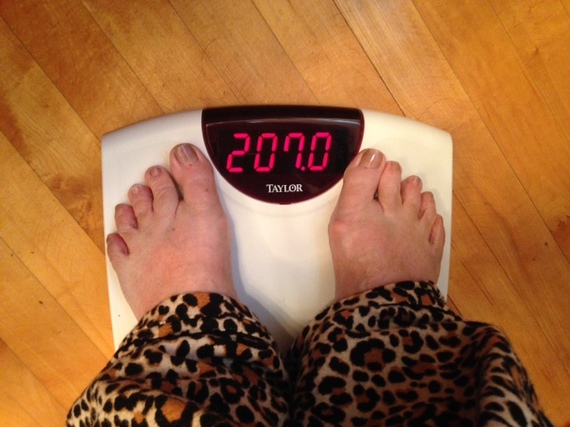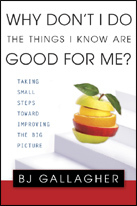Last week I attended a women's conference, where I ran into an old friend I hadn't seen in a couple years. I almost didn't recognize her, she had lost so much weight. "Carol, you look amazing!" I said. "You're so fit and trim! How did you lose weight? What's your secret?"
"It's no secret," Carol smiled. "I'm happy to share. I gave up dieting! I've spent practically my whole life on one diet or another, but I always put the weight back on -- and more. So finally I decided to try something different -- I went to Overeaters Anonymous."
"Is that like Alcoholics Anonymous?" I asked.
"Yes," Carol replied. "It's based on the same 12 steps as AA. For people like me, food is a drug -- it's anesthesia, it's a way of numbing out uncomfortable feelings."
"You're talking about comfort food?" I asked.
"It's comfort food taken to the extreme," Carol said. "Some people can indulge in a little comfort food now and then -- mac-and-cheese, mashed potatoes, ice cream, cake, cookies, chips, candy, and other soothing treats. But for people like me, with a tendency toward compulsive behaviors, we can't stop eating our comfort foods. We're addicts. Just like some people can have a glass of wine and let it go at that, while others become alcoholics. We food addicts are different from the average person who can eat one treat and stop. For a compulsive eater, one cookie is too many, and a thousand aren't enough!"
I had to chuckle. Carol's comment reminded me of that old potato chip commercial from years ago: "Bet you can't eat just one!" Certainly true for me when it comes to chips, peanuts, or salty favorites -- I can't eat just one.
"How did you find out you were a compulsive eater?" I asked.
"I had heard about the program some years ago from a friend who was in AA," Carol said. "I marveled at how the program had transformed her life. One day we were talking and I joked that I kind of wished I was an alcoholic, because I envied the joy and happiness, the inner peace she had. But I didn't have a problem with booze -- I had a problem with food. That was when she told me there is a 12-step program for people with food and weight problems, so I decided to check it out.
"I went to several different meetings to see if the program was something that might work for me. I met women like me -- who had tried every diet in the book but were never able to sustain their weight loss over the long haul. I also met people who had completely different food issues from mine -- like anorexics, who restrict their food and get really skinny, but can kill themselves in the process. There were bulimics -- who overeat and then make themselves throw up as a way to control their weight. I couldn't always identify with the eating behaviors of everyone, but I could always identify with their feelings. We all want to be attractive and accepted by others, but our crazy food habits make us want to isolate. We all seem to have body image problems -- especially women -- though the men in OA have body image issues, too. Low self-esteem is often at the core of our addictive relationship with food.
"I hated to admit that I was a compulsive eater. Food soothed my emotional pain -- but at the same time, food made me fatter, then I hated myself even more. It's not sexy or cool to be a compulsive eater. It's humiliating to be fat and unable to control what I put in my mouth. I didn't want to be an addict, a sugar junkie, but I finally had to admit that I was.
"The most important thing is that I kept coming back, even though I didn't like all of the meetings. Some were better than others. And I'm glad I stuck with it. I'm glad I kept trying different meetings rather than going to just one and rejecting the program. Otherwise I would have missed out on the miracle."
"Well, whatever you do at those meetings, it's clearly working," I said. "Not only are you slender and trim, you look happy. You seem relaxed and peaceful."
"Thanks for noticing," Carol said. "What I get from OA is something I could never get from a diet. Diets deal with what I was eating, but OA helps me discover why I was eating. We have a slogan: 'It's not what you're eating -- it's what's eating you.'"
"Huh?" I asked.
"It's all about feelings," Carol continued. "Compulsive eaters use food to stuff our feelings: fear, anxiety, stress, resentment, anger, frustration, sadness, grief, disappointment. We reach for food when something is bugging us. But OA gives us tools to cope with our feelings; they teach us how to handle resentments so we don't eat over them; they teach us to make outreach calls when we need help with a difficult situation. The 12 steps of Overeaters Anonymous help us create a healthy relationship with food, with other people, and most importantly, with ourselves."
"How can you tell if you're a normal person who just occasionally turns to comfort food or if you're a food addict?" I asked.
"We have a list of questions you can answer about your relationship with food," Carol said. " I can't remember all the questions off the top of my head, but you can find the list on the Internet, I'm sure."
I thanked Carol for sharing her experience, strength and hope. I have many friends whose lives have been transformed by their participation in AA, so I was happy to learn that there is a similar program for people who use food as a drug. Given the obesity epidemic in America today, I suspect that compulsive eaters number in the millions.
(photo credit: Steps to Success, used with permission)
Here is the list of 15 questions Carol mentioned: ARE YOU A COMPULSIVE EATER?
For more information about OA resources and meetings in your area, visit www.oa.org
BJ Gallagher is a sociologist an author of 30 books, including "Why Don't I Do the Things I Know Are Good for Me?" (Berkeley/Penguin)
---
If you're struggling with an eating disorder, call the National Eating Disorder Association hotline at 1-800-931-2237.

